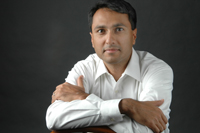Teaching young people how to appreciate and engage in religious diversity is critical to achieving peace and security in the world, says the winner of the prestigious 2010 Louisville Grawemeyer Award in Religion, presented jointly by Louisville Presbyterian Theological Seminary (LPTS) and the University of Louisville.
Eboo Patel, founder and executive director of Interfaith Youth Core, won the prize for his 2007 autobiography, Acts of Faith: The Story of an American Muslim, the Struggle for the Soul of a Generation. He was selected from among 67 nominations worldwide.
Eboo Patel’s dream is to build a world where interfaith cooperation is the norm.
Patel’s organization, based in Chicago, encourages young people of different religions to perform community service, explore common values, and build bridges among diverse faiths, which he says is vital to the world’s future. The organization is now active on about 75 college campuses.
Patel was born in India to a Muslim family and immigrated to Chicago as a child. As a teenager, he struggled with what he saw as a lack of religious pluralism in America. In Acts of Faith, Patel, now 34, tells his own life story of how he first felt his different identities as Indian, Muslim, and American clashed with one another, but later realized that appreciating the common value of pluralism among all three was the key to finding peace.
In his book, Patel notes that some of the most devastating acts of terrorism over the past two decades were perpetrated by people between the ages of 15 and 30 who had been nurtured by the teaching of violent religious radicals: The Atlanta Olympic bombings in 1993; the attacks on September 11, 2001; the London bombings in 2005; the assassination of Yitzhak Rabin; the Midwest shooting rampage targeting Jews, Asians, and African Americans in 1997; the religious violence in India, Sri Lanka, West Africa, and other places.
“Every time we see a teenager kill someone in the name of God,” Patel writes, “we should picture a pair of shadowy hands behind him, showing him how to make the bomb or point the gun…and then we should ask: ‘Why weren’t the hands of people who care about pluralism shaping that kid instead of the hands of religious totalitarians?’”
“Religious extremists all over the world are harnessing adolescent angst for their own ends,” said Susan Garrett, LPTS professor of New Testament, who directs the religion award. “Patel urges us to take advantage of the short window of time in a young person’s life to teach the universal values of cooperation, compassion, and mercy.”
Patel’s own experiences prompted him to launch a movement to build interfaith cooperation by inspiring college students to champion the cause for unity and peace. He formed Interfaith Youth Core in 1998.
A Rhodes Scholar, Patel is now a member of President Obama’s Advisory Council on Faith-Based and Neighborhood Partnerships and the Religious Advisory Committee of the Council on Foreign Relations. In October, U.S. News & World Report named him one of America’s Best Leaders in 2009.
Earlier this year, Patel won the Roosevelt Institute’s Freedom of Worship Medal. Previously, he was named by Islamica Magazine as “one of 10 young Muslim visionaries shaping Islam in America” and chosen by Harvard’s Kennedy School Review as one of “five future policy leaders to watch.”
A board member of the Chicago Council on Global Affairs and member of the national committee of the Aga Khan Foundation USA, he also is a Young Global Leader in the World Economic Forum and an Ashoka Fellow, a distinction awarded to a select group of social entrepreneurs.
He has spoken at the Nobel Peace Prize Forum in Minnesota, the Clinton Global Initiative in New York City, and the Martin Luther King Jr. Commemorative Lecture at Westminster Abbey in London.
He will speak about his award-winning book at LPTS on April 14, 2010.
Besides writing a religion blog for the Washington Post, “The Faith Divide,” Patel has written for the Chicago Tribune and Sunday Times of India. He is a regular guest on CNN and National Public Radio.

